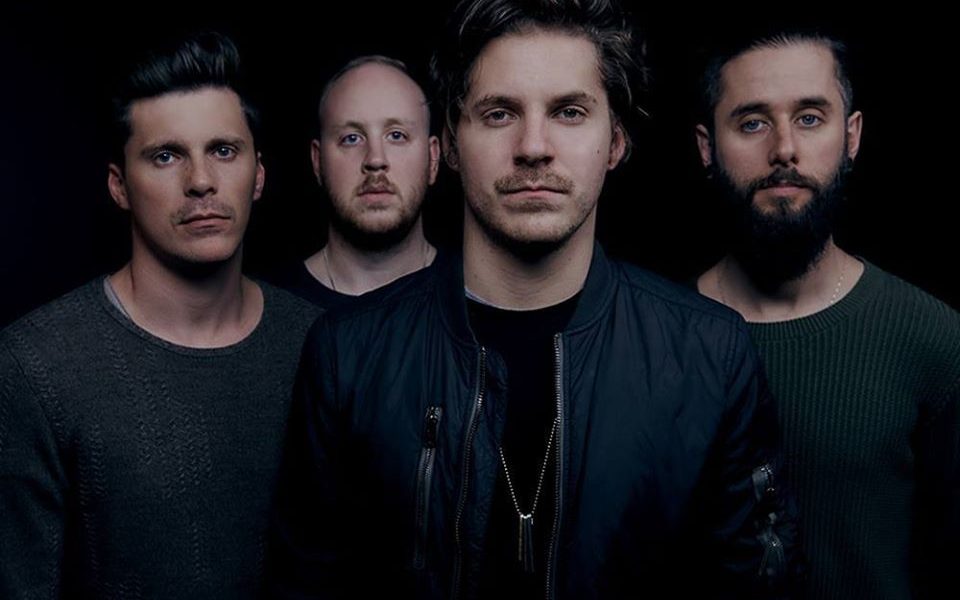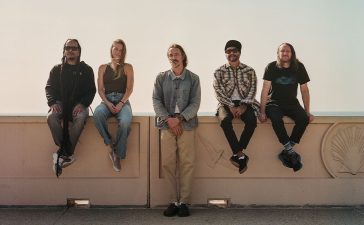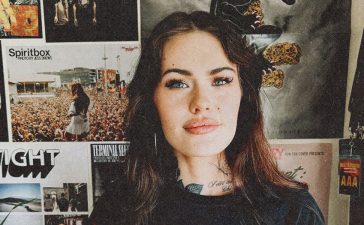There’s a certain mystique that surrounds Nashville residents Our Last Night.
The members are active on socials, but you won’t find them pontificating to their massive following. Interviews are few and far between yet their catalogue is prolific and their output is rapid. Our Last Night is a band who chooses to focus on their business; their craft; not where they’ve been, but where they’re going, and how they’re getting there.
Whereas most musicians enjoy a schedule far removed from that of the corporate world, Our Last Night apply a heft dose of corporate professionalism to their project. As such, vocalist Trevor Wentworth had recently returned from scheduled leave, and was back in the office for the new year.
Speaking to this point, Trevor confirmed to Blunt that Our Last Night, as a business, runs a very tight ship. “We actually have no label, no publicists, no management, no anything. We just do everything ourselves”.
“It works for us”, Trevor says of their entrepreneurial approach. “But I would say it’s a lot different than how most bands function”.
It wasn’t always a self-sustained operation for the band, who were signed to punk-rock monolith Epitaph Records in 2008 for three albums released across 7 years. “It was a great experience,” Trevor says, “But I think throughout that time we realised no one really understands our band or our project.”
It would be the last straightforward record deal the band signed. A decision they sit well with; trading extended holidays and sleep-ins in exchange for artistic freedom.
“It’s a lot of work playing the roles of a label and manager at the same time as trying to write the music and do everything creative. But, it gives you the freedom to do whatever you want, when you want to put out a single; let’s write it, let’s put it out on Spotify and let’s promote it.”
It makes for an interesting comparison – the Our Last Night of today to the Our Last Night of a decade ago when, at this exact moment, they were putting the final touches on We Will All Evolve, their sophomore record or as it’s known in industry parlance, ‘The Difficult Follow-Up Album’.
The comparison is even more striking for Trevor, given he was just 16 years old when We Will All Evolve hit stores.
“I think our goal 10 years ago when that record came out was: let’s tour as much as possible. Let’s play in front of as many people as we can. Let’s do press. Let’s do all this stuff. It was draining and we were just slowly realising we weren’t really gaining as many fans as we hoped doing these support tours.”
To learn what caused this variance between intention and impact, we need to go back to the atmosphere surrounding their album prior to We Will All Evolve; the debut record, 2008’s The Ghosts Among Us.
“When Epitaph first signed us, I was 14 years old, everyone else was about 18, 19. I think they were looking at it like we’re going to market this band as the The-Justin-Bieber-young-kid of hardcore. The music was good. But I definitely see why they signed us to begin with.”
By the time work began on We Will All Evolve, relationship between band and label began to dwindle. “The first record didn’t do as well as they hoped”, Trevor recalls, “I think they kind of shelved us after that…”
“Because now I’m 16 and now it’s less cool because I’m not as young. We Will All Evolve did great for the scene, but I don’t think it did what they were expecting.”
Despite the potential career and artistic progression that came along with We Will All Evolve, (by both name and nature) Our Last Night suddenly felt a cold reality of the industry. “I don’t think we heard from Epitaph via like email or phone for almost a year,” Trevor says.
“The three records that we did on Epitaph were awesome. They were a great learning experience. But really I think after we parted ways with [the label] is when Our Last Night became who Our Last Night actually is.”
Following on from We Will All Evolve, the band released Age Of Ignorance in 2013, signalling the end of their deal with Epitaph. This would normally be a fatal blow to young bands in a similar position and Trevor admits, it almost was for them, too. “There were a few months where we thought about just breaking up. Definitely.”
But not after one final hurrah.
“At the time we were like, “fuck it, let’s try and do a crowdfunding campaign. Let’s do an EP ourselves, no label”. The campaign was a screaming success and ushered in a new era for Our Last Night, earmarked by the release of Oak Island, also in 2013.
With Oak Island, and the lead single ‘Sunrise’ in particular, the band soon began to see and feel considerable traction. “We worked with our fans together throughout the whole recording process and built this super core fan base that just followed us throughout whatever we did. I think that is definitely what got us here today.”
With this came a new found sense of clarity (pun absolutely intended) in their mission, Trevor explains.
“The difference between then and now is now, we focus everything that we do online. ‘Let’s gain as many new fans as possible through YouTube, Spotify playlists, Instagram. TikTok…'”
“Now, we focus so hard on that and tour less, but when we tour, it’s more successful because we focused so hard to gain these new fans. [Previously] we’d gain, whatever, 20 fans a show. Which is awesome. But now you can put out a video on YouTube, or get a song on a Spotify playlist and gain a million fans in a month.”
It was also at this time that the band tapped into a bourgeoning commodity; one that few bands had successfully turned into a viable career option though many tried: Covers.
“This actually goes back to while we were still on Epitaph”, Trevor says.
“We had a manager at the time who was working with these kind of YouTube artists who only did covers and they would go to, like, Southeast Asia and they would headline these crazy shows in front of 10,000 people and they’re just these kids from New York or California who sit in their bedroom, do these covers, film it themselves, put it on YouTube and they go crazy viral. At first we did not want to do it at all.”
“We were like, ‘no way. If we start doing these covers, we’re going to be known as the cover band. Blah blah blah’. And now we are, but I don’t really give a shit. It’s fine. I’ll take that”.
Those familiar with the Our Last Night’s work since 2013 will know well of their fabled covers. Typically picking Top 40-style hits, the band flips them to include distortion, double-kick and duelling clean vs dirty vocals – sometimes mere hours after the original is released. The series began with a viral cover of Adele’s ‘Skyfall’, now viewed more than 16 million times.
“We love doing them. It’s fun. It’s a cool marketing tool that we use to help promote our band, which is really the main reason we do it because we have no label. We just use that to get our band name out there. Then when we play live, we’ll play one cover at most live.”
Between 2013 and now, Our Last Night had released an anthology of covers, as well as 2015’s Younger Dreams, Selective Hearing the following year and in 2019, the two-part EP Let Light Overcome / Over Come The Darkness all the while amassing millions of views and spins.
But the evolution continues.
As Trevor explains, Our Last Night is yet to reach it’s final form. For where to go next, the band once again draws on their recent experiences.
“We’ve done so many EPS in the past because nowadays – at least this is how we feel as a band – when releasing a full length you don’t get the full attention each song deserves.”
“This year,” Trevor says of their refined 2020 game plan, “we’re working on a re-release, which will have both of the [2019] EP’s combined into one, a couple of acoustic songs, a live track, and then maybe a bonus song. That should be out in March.”
“Then, besides doing a handful of covers, we’ll definitely be releasing more singles throughout the year.”







